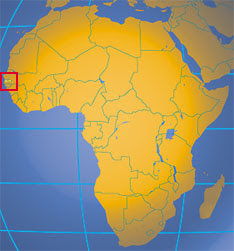The month of Ramadan is the Muslim month of fasting during which all muslims in the world who are physically able fast every day. From sunrise to sunset, they drink no water and eat no food. From what people have told me, Ramadan is about showing devotion to Allah through fasting, purifying your body, and gaining compassion for those who do not have the basics of life through experiencing a little of their difficulty. During this month, the people in this area, who are a pretty religious lot to start with, become extra religious. They have longer than usual prayer services in the evenings, and i have seen more people sitting around studying the Koran. They are also supposed to be extra careful about keeping all of the Koranic laws during this month. Everyone does all the work they normally would on the farm and around the house except without eating or drinking. It's intense!
The fast is organized on the lunar calendar, so it has been going on since about the 10th of last month and has just a few days left. I have fasted for 3 days so far, but I've never even tried to make it the whole 14 hours without water. My general (well, all 3 times) routine is to drink water before I leave my house in the morning so I shouldn't have more than about 10 hours without water. Even with most of the village fasting, I'm still able to find food in the middle of the day. It's just a little more interesting than usual. Since the children aren't fasting, they're the ones in charge of getting lunches together for themselves. It's been a funny combination of leftovers from the night before and sauces made from leaves the kids can get from the bush themselves and sometimes even less preferred parts of the fish the girls had hidden away when they were cleaning the fish the night before. And with the kids being in charge of the cooking, I don't get my own bowl so I eat with the little girls around their bowl. (Actually I don't know if I've ever addressed the way people eat in this blog. See * below) With some of the women their daily question is not "Are you fasting?" it's "Are you a kid today?" And most days I'm a kid. I'm not going to miss being asked if I'm fasting and/or told I should be fasting 50 times a day, and I'm glad that it'll be over just so everyone else can eat, but I have had a good Ramadan.
The Ramadan ends sometime in the middle of this week (depending on when you can see the moon- it is yet to be determined). Everyone celebrates the end of Ramadan with big parties and good food. Surprisingly enough, one of the most exciting foods to me and everyone else is soured milk with pounded millet in it called chakari. When I came to The Gambia, having to eat soured milk was one thing that made me really nervous, but now I'm just sorry we hardly ever have it. Supposedly after sunset on the last day of the fast, the party begins. There's food for all and lots of dance parties. All of the young people go around to different villages in the area to attend all the parties, see all their friends, and celebrate the fact that after a month of experiencing hunger they can appreciate all they have.
*People here eat out of a communal food bowl. Each family generally has a series of food bowls divided by who eats together. "Strangers" like me and any non-family visitors get their own small bowls. The men and teenage boys all share one bowl (which is probably 2 feet in diameter- it's a big bowl). The women and children share one bowl. The grandmothers of one side of the family share one bowl and the one grandma on the other side of the family gets her own. There are a few more bowls that are around for random parts of the family but you get the idea. The bowl sits on the ground and all of the people eating out of the bowl crouch around the bowl and use their right hand (the clean hand) to eat. Everyone has a pie shaped section of the food that is "theirs." Everything in "your" section is yours and if you don't want it you can put it in the middle of the bowl. Anything in the middle is free game and you can feel free to take pieces of it an move it to your place. People who are nice might even throw something they know you like into your place so you can have it. When you eat you take a handful of food, ball it up and eat it out of your hand. Then you go for another. The older men often use spoons, and sometimes if I'm eating at someone's house or office they will give me a spoon because I'm the guest, but for most families only the fathers of the family would have spoons and everyone else would use their hands.




















